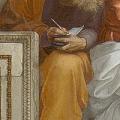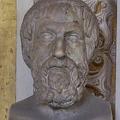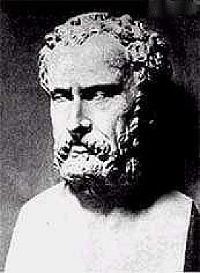3 - Created In Our Image: Xenophanes Against Greek Religion
Posted on
In this episode, Peter talks about the Greek gods in Homer and Hesiod, and the criticism of the poets by the Presocratic philosopher Xenophanes.
Themes:
Further Reading
J.H. Lesher, Xenophanes of Colophon: Fragments: A Text and Translation with Commentary (Toronto: University of Toronto Press, 1992).
E. Mogyoródi, “Xenophanes as Philosopher: Theology and Theodicy,” in A. Laks and C. Louguet (eds), Que-est-ce que la philosophie Présocratique? (Lille: Sepentrion, 2002), 253-86.
M. Schofield, “The Ionians” in C.C.W. Taylor, Routledge History of Philosophy vol.1 (London: Routledge, 1997), 47–87.







Comments
Was Xenophanes the first monotheist in Greece?
Did he draw any inspiration from other monotheists, like "the J writer" in Israel, or Akhenaten in Egypt?
In reply to Was Xenophanes the first monotheist in Greece? by Malcolm
im pulling this out of my ass
im pulling this out of my ass, but here's an idea. perhaps even people like thales and anaxander and heraclitus were monotheists in their own way. anaxander had an idea of the infinite, right? and thales thought everything was "water" and heraclitus "fire" so isn't this their single monotheistic god?? to me it seems like them grasping at what the nature of that single god must be.
In reply to im pulling this out of my ass by tommy
Monotheism
Of the thinkers you mention, I think perhaps Heraclitus is the best candidate to be a "monotheist." After all Thales does have a remark about the gods and he doesn't seem to be equating them with water, whereas Heraclitus said "thunderbolt [= fire, presumably] steers all things." Of course with Xenophanes some sort of monotheism gets into Presocratic philosophy almost immediately, so it is always on the table as it were. One caveat though: some Greek philosophers, for instance Plato, recognize a single highest god but then also lesser gods as well. So that is not quite monotheism but might remind us of it.
In reply to Monotheism by Peter Adamson
thank you so much for your
thank you so much for your response! would these thinkers have run into zoroastrian thought? or hindu concepts of monotheism, where a supreme being sites above a multifacted godhead or something? or maybe they all share a similar conceptual ancestor in a proto-indo-european cosmology? perhaps you answer this in later episodes, if so im sorry!
In reply to thank you so much for your by tommy
Ideas from the east
Well, not yet but in the current India series we have an episode planned on possible influences between the Greeks and Indian thought. I tend to be skeptical about this sort of thing, though; clearly there is the idea of monotheism floating around in the ancient world from early on (just think of the Hebrew Bible) but whether that really helps explain much about, say, Xenophanes, I very much doubt.
In reply to Ideas from the east by Peter Adamson
Jews meeting Greeks
Seeing as the first temple was destroyed in 586 B.C.E., and that most of the jews were banished to Babylonia, I would assume that it would be quite likely that the philosophers could have had contact with Jews. Also, you can see many signs of Jewish culture in Greek culture, or vice versa (I don't know), such as the Bema, which in Jewish culture is where the person reading Torah or speaking/leading a service stands.
Where to find all the Presocratic fragments?
Can anyone direct me to a book or web site containing a comprehensive coverage of all the Presocratic fragments without author commentary and interpretation. I bought a Barnes text but was disappointed in the constant digressions and interpretations, many of which are hard to rationally reconcile.
Any direction on this is very appreciated.
In reply to Where to find all the Presocratic fragments? by TD
Presocratics
What you want is the collection by Kirk Raven and Schofield, it is on the reading list on the Presocratics page here on the website.
In reply to Presocratics by Peter Adamson
Thanks I'll see if UofT
Thanks I'll see if UofT bookstore has it.
Incidentally, your project here is excellent, very thankful for it's creation, I'll reference it in the face book pages devoted to some of my favourite philosophers.
Was Descarte reading Xenophanes Fragments?
When Descartes says in his "Principles of Philosophy" (section XIX) "It is of the nature of the infinite not to be comprehended by what is finite" it sounds suspiciously like it came from a Xenophanian Fragment.
In reply to Was Descarte reading Xenophanes Fragments? by TD
infinite
I don't know what if anything Descartes knew about the Presocratics but he wouldn't have needed Xenophanes fo the idea you mention here; that is a very standard claim in medieval scholastic philosophy, which Descartes certainly knew (and which he repeats more than he admits!).
In reply to infinite by Peter Adamson
Unconscious plagiarism?
Don't get me wrong I love RD but I've noticed even in the first few pages of Meditations a mirror image of Platos Theatetus and its key points. Do you know if this dialogue was available in RD's day? If so was there a standard for citation back then like we have now?
In reply to Unconscious plagiarism? by TD
Descartes and Plato
I don't know if Descartes is likely to have read the Theaetetus, maybe someone else can enlighten us there. But I am more confident on the citation issue: no, generally speaking in philosophy before pretty recently I don't think there was necessarily any expectation that you would, as it were, footnote all your sources. Having said that Descartes was pulled up for having taken his ideas from earlier thinkers, for instance the cogito from Augustine (I mention this in the City of God episode). In his case he of course made a big deal about how original he was being, so perhaps he invited this accusation more than other authors would have at the time.
small correction
Great podcast -- especially wonderful to hear about Xenophanes! A couple of quick corrections:
Hesiod was from Boeotia, which is pronounced "bee-OW-shuh" or "bee-OW-shee-uh," and it's inland, not an island.
In reply to small correction by longtime liste…
Boeotia
Yes, thanks - I actually caught that mistake a while back, it has been fixed for the book version!
In reply to Boeotia by Peter Adamson
Ascra ahoy
Great! Hesiod is a land-lubber after all..."If ever you turn your misguided heart to trading and with to escape from debt and joyless hunger, I will show you the measures of the loud-roaring sea, though I have no skill in sea-faring nor in ships; for never yet have I sailed by ship over the wide sea, but only to Euboea from Aulis where the Achaeans once stayed through much storm when they had gathered a great host from divine Hellas for Troy, the land of fair women. Then I crossed over to Chalcis, to the games of wise Amphidamas where the sons of the great-hearted hero proclaimed and appointed prizes. And there I boast that I gained the victory with a song and carried off an handled tripod which I dedicated to the Muses of Helicon, in the place where they first set me in the way of clear song. Such is all my experience of many-pegged ships."
Origin of Ethics in Greek Civilization
Xenophanes criticises the work of the poets because of their potrayal of 'flawed' gods engaging in adultery, theft, deception, etc. I'd love to know, where his notion of ethics arose from. Our ethics (and laws) are heavily influenced by our religion. Abrahamic religions for Western and Middle Eastern societies (and perhaps those Asian societies which have been colonized) and the local religions in the East.
The religions feature Godlike figures (Buddha, the Prophets and the Saints, the various mythological figures from Hindu texts, etc) who work as benchmarks of morality of sorts. So what was Xenophanes' yardstick for morality? This is my first foray into Philosophy so I'd love for you to recommend me some more reading material.
In reply to Origin of Ethics in Greek Civilization by Chaitanya
Early Greek morality
That is a great question, and I definitely don't know the answer! One thing to say is that Xenophanes may not have been attacking Greek religious ethics "from the outside" as it were, so much as pointing out contradictions within it. For a much more detailed version of the same thing have a look at Plato's Republic (only one of many reasons to read that book!). For the Presocratics the place to start is definitely the Kirk, Raven and Schofield collection of fragments with commentary but I also really like James Warren's book on Presocratic philosophy as an introduction.
In reply to Origin of Ethics in Greek Civilization by Chaitanya
I have the same question as
I have the same question as you and like you, this is my first foray into Philosophy aswell.
But in my humble opinion, Xenophanes couldn't assume God/God's to be flawed in the sense that no human being would go out one day in the hopes of being deceived, or lied or cheated upon. We might lie, decieve all the time but just to give you an analogy, all of us would never go out to the market in the hopes of getting less for the price I'm paying. Meaning we can cheat others but would never want to cheated in anything. And it is safe to say that this also proves that consciousness of right and wrong is inside of us. What revelation does, is give this consciousness detail.
So I believe Xenophanes thought that what we wouldn't like our fellow human beings to be (liars, murderers etc), how can we possibly want rather BELIEVE our gods to be? And on top of it then paying sacrifices etc to such 'imperfect' god/s.
If you have researched on this since you left this question, please do let me know aswell. I just gave you my side of the thought :)
Xenophanes
I am thinking that Xenophanes lays the groundwork for focusing one of human nature's frailties. Hubris. By this I am referring that on one hand humans will readily admit they can not know everything and can only believe that their beliefs are true. Where hubris comes into play is when beliefs become knowledge or facts. In my view, intolerance can be defined as the closing of the mind. Once beliefs are no longer separated from knowledge/verifiable facts, the mind closes and intolerance breeds hatred.
Greek Gods
Xenophanes is cited for originally going against the myths about Greek Gods. But it is the Greek God myths which are unusual, for almost all myths are respectful of ancestors. How Greek culture evolved with ideas against the anthropological universal of ancestor worship and its praise of kinship is the real puzzle, not Xenophanes' critcism of it. Perhaps these strange myths are what allowed the Greeks to develop their unusual trait of skepticism, which is at the heart of a scientific approach and increasing knowledge.
Greeks and Jews
Hi, I stumbled upon this while conducting research on the subject of intersectionality between Jewish and Greek thought. Can anyone help me with this matter?
Diogenes Laertius on Xenophones
Would you be so kind as to give your evaluation of how trustworthy Diogenes Laertius's description of the views of Xenophanes is?
https://www.perseus.tufts.edu/hopper/text?doc=Perseus%3Atext%3A1999.01…
To call Diogenes a "late" witness is an understatement. I ask this because the wikipedia article on Xenophanes seems simply to track Diogenes's characterizations (spheroid nature of God, extreme skepticism, infinite number of worlds, etc.). This does not match your presentation---which I find very convincing. When I was teaching history of philosophy, students usually went to wikipedia for their summaries of philosophers, although it was only later I realized this. Thus my question.
Thanks for the kindness.
In reply to Diogenes Laertius on Xenophones by Augustine Thom…
Xenophanes
Well, that's a difficult question because we don't have an abundance of alternative information and where we do have alternative information, it is often subject to the same worries as Diogenes (written much later, for example). Diogenes is of course himself only repeating what he has found in other sources. At least some of what is in his report is as reliable as any information on Xenophanes e.g. the spherical god. Typically the "biographical" information is to be treated with extreme skepticism - lots of nice anecdotes that sound made up, and invented teacher-student relationships. But he is one of the more important sources for the Presocratics in general and that applies here too I guess (though I have not made a special study of the fragments on Xenophanes in particular).
Small Correction
I stumbled on this podcast recently, and I'm really enjoying it! I have one quick comment, which I'm guessing you probably have already addressed in the print version, but which I figured might be helpful for future podcast listeners. At one point around 14:45, I think you accidentally used the name "Isis" (an Egyptian fertility goddess) when you meant "Iris" (the Greek goddess of the rainbow).
In reply to Small Correction by BT
Iris vs Isis
Good grief! You are the first person to point this out and the episode has been up for more than ten years. Well spotted!
On the bright side (pun intended) it was caught and fixed for the book version.
Add new comment